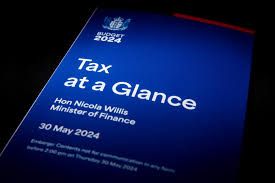Budget Update
The recent budget announcement in late May, along with various economic updates, has provided several key insights into the current and future economic landscape. Here is a breakdown of the significant points and changes that businesses and individuals should be aware of:
Economic Overview
- Economic Growth: growth has slowed and is expected to remain sluggish for some time.
- Inflation: while it remains high, it is falling gradually. The budget did little to address this issue directly.
- Business Impact: the Budget largely omitted new incentives for businesses, focusing instead on rebalancing.
Personal Income Tax Changes
One of the most notable updates is the adjustment of personal income tax rates, effective from 31 July 2024. This was a key promise in the National election campaign;
New Tax Thresholds
- 10.5% Rate: increasing to $15,600 (is currently $14,000)
- 17.5 % Rate: increasing to $53,500 (is currently $48,000)
- 30% Rate: increasing to $78,100 (is currently $70,000)
Composite Tax Rates for 2024/25
Due to these changes taking effect from 31 July 2024, there will be composite tax rates for the 2024/25 tax year. The breakdown is as follows:
- Up to $14,000: 10.5%
- $14,001 to $15,600: 12.82%
- $15,601 to $48,000: 17.5%
- $48,001 to $53,500: 21.64%
- $53,501 to $70,000: 30%
- $70,001 to $78,100: 30.99%
- $78,101 to $$180,000: 33%
- Above $180,000: 39%
Action: Review payroll systems to ensure they reflect these changes starting from 31 July 2024.
FamilyBoost Initiative
Effective from 1 July 2024, the FamilyBoost Initiative provides financial support for families:
-
Benefit: 25% of Early Childhood Education (ECE) fees, up to $75 per week.
-
Eligibility: Families with an income up to $180,000 per year. This maximum payment reduces for families earning over $140,000 per year.
-
Requirement: Keep ECE receipts and submit them to the IRD quarterly.
Other Notable Changes
- Lump Sum Payments: New tax treatments of lump sum payments from ACC and MSD.
- GST Adjustments: Changes for electronic platforms like Uber and Airbnb.
- KiwiSaver Contributions: Government contributions during Paid Parental Leave.
Next Steps
For businesses and individuals, these changes necessitate a review of payroll systems, financial planning and compliance measures.
If you would like to discuss how these changes may impact you, or need assistance with adapting to the new regulations, please get in touch with our team. We are here to help you navigate these updates and ensure your financial strategies remain robust and compliant.





